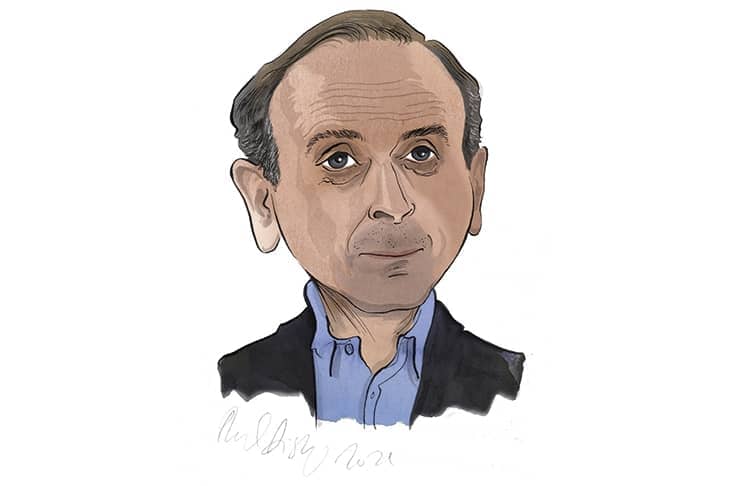The news that the highly influential third-generation member of the Le Pen family, Marion Maréchal, will not be backing her aunt Marine for the French presidency is ‘brutal, violent and painful’, in Marine’s words. But beyond its emotional impact on the Le Pen family, for whom politics, betrayal and intrigue have always been of Shakespearean dimensions, this is potentially an earthquake in French politics. For the 32 year old intellectual branch of the family has hinted that she may join Éric Zemmour’s campaign. Far more important than its impact on the presidential race is the potential to achieve what was the quest of General de Gaulle in 1958 and more recently Eric Zemmour: union of the French Right in a single British style broad church conservative party.
Before the right wing polemicist Éric Zemmour even thought of standing in the presidential race, he had spoken out forcefully for a union of the two main strands of France’s Right: the Rassemblement National and the Parti Républicain. His decision to stand for the presidency had two main aims. First to shift the French political debate to the ‘real’ concerns of the French people considered taboo by a politically correct media: immigration, national sovereignty, a tentacular European Union, toxic identity politics, and, in his view, the unrelenting suffocation of people’s true concerns by bien pensants media and judges. Even his most ferocious critics would acknowledge that he has successfully orchestrated that swerve, with opinion polls pointing to France being at its most right wing since the beginning of the 5th Republic. His second aim was to draw together the traditional Gaullist right and the radical populist right of the Rassemblement National into a single entity.
In 1958 General de Gaulle, and his prime minister Michel Debré, sought to end the governmental instability of the Fourth Republic – racked by the internecine squabbles of a multiplicity of political parties – by constitutional means: most notably the two-round majority voting system that forces parties to come together in the second round to secure parliamentary seats. De Gaulle was successful. The dominant party from 1958 to the 1970s was the Gaullist UDR that was a broad church party that like its British Conservative neighbour integrated populist and traditionalist voters.
By the end of the 1970s Gaullist constitutional devices had even forced together the fissiparous elements of the French left into a common programme uniting the French Communist Party and the Socialist Party. The result was François Mitterrand’s presidential victory in 1981. In the meantime a far right party had sprung up on the French scene under the leadership of the firebrand Vichy sympathiser and supporter of French Algeria, Jean-Marie Le Pen, tapping into growing concerns about immigration. It had no representation in parliament, outlawed as it was by the two-round electoral system.
This is when the great Machiavelli of post-war France played his masterstroke. For the 1986 legislative elections an increasingly unpopular Mitterrand changed the two-round majority voting system to proportional representation ostensibly in the interests of democracy. However, Mitterrand’s ulterior motive was to boost parliamentary representation of the Front National and sow division in the traditional Gaullist right. 35 Front National députés were duly elected; French media and the traditional French right were outraged. The idea that France, the cradle of human rights, could even have such a party ensured that a ‘cordon sanitaire’ was thrown around the Front National. Its pariah status was confirmed. For the traditional Gaullist right the word went out that there could never be a deal with such a party. The 1988 general elections reverted to the two-round system and the Front National was cast into the political wilderness. But its popularity continued to grow, just as that of the traditional Gaullist party declined.
Zemmour believes that now is an opportune moment to fuse together the national populist and traditional conservative strands of the Right. Marion Maréchal, though an ex-Rassemblement National député, has promoted policies that appeal far more to the national conservative elements of the Parti Républicain – on immigration, liberal economics, opposition to same-sex marriage – than her more social populist aunt Marine. There has already been one high profile defection from the Parti Républicain to Zemmour’s campaign, along with several from the Rassemblement National. But Zemmour is playing the long game, as indeed is Marion Maréchal. In the short term it is a gamble that if Marine Le Pen’s niece does defect to Zemmour this will leapfrog his score from the present 13 per cent to second place ahead of Marine Le Pen (17 per cent) and Valérie Pécresse (18 per cent) to challenge Macron in the second round. But the odds are far shorter on the 2027 presidentials seeing a union of the French rights behind the candidature of Marion Maréchal. With this, the journalist Zemmour would have achieved his two fundamental objectives and thus have radically altered French politics.
Got something to add? Join the discussion and comment below.
Get 10 issues for just $10
Subscribe to The Spectator Australia today for the next 10 magazine issues, plus full online access, for just $10.



















Comments
Don't miss out
Join the conversation with other Spectator Australia readers. Subscribe to leave a comment.
SUBSCRIBEAlready a subscriber? Log in